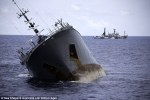Source & Author: House of Ocean
Who Fishes Far recently announced the availability of new information through their pioneering database, which represents an unprecedented achievement in affording visibility to information that is rarely accessible to the public.
The announcement, which can be accessed here, warns of gaps in the information. Amongst these, the ongoing lack of availability of a unique vessel identification number is highlighted as being of concern, despite the fact that European vessels have an authorisation number. The reason for this is that there is a recognised need for a global tool for the identification of vessels across all registries and ports. This deficiency has been of widespread concern in the sector, and has been discussed extensively in the global forum of the FAO.
IUU fishing success depends upon opacity
The absence of this vessel identification number across the spectrum of ocean-going fishing and support vessels is important, because vessels flagged not just to European member states, but to the majority of distant water fishing states, are not constrained to perpetually operate under the same flag. Owners are able to re-register vessels to other flags in pursuit of commercial or practical preferences. Through this re-registration process, the traceability of a vessel’s identity can easily be lost, and a unique vessel identifier, such as the universally acknowledged IMO number, may be the only element of permanence in what may otherwise be an unrecognisable ship.
It is clear from Interpol’s purple notices amongst other sources that a recurrent modus operandi of vessels engaged in IUU fishing operations that the masking of a vessel’s identity, nationality and history by way of frequent re-flagging is a persistent strategy adopted by IUU operators. Yet states that ostensibly subscribe to all the major international treaties on fisheries conservation and management persistently decline to make essential vessel information available and verifiable.
For instance, clear registration procedures, the identity of their vessels and specification of licence conditions is rarely accessible even though disclosing this information is in principle cost-neutral. An unfortunate recent example is the case of Thunder, a known IUU vessel whose registration and licensing status by Nigeria has never been fully disclosed.
Insufficient progress despite key importance of transparency
The potential and specifics of a global record of fishing and supply vessels and reefers has been repeatedly discussed by COFI, whosestrategy document makes clear that a globally adopted system of vessel identification would form the lynchpin in the convergence of IUU fishing control data-sharing, and in the coordination of regional and global control regimes. This includes the much hoped for operational success of the 2009 Port State Measures Agreement, which came into force this month, and which relies for functionality on the disclosure and availability to port authorities of key data involving vessel identity and authorisations.
In addition to vessel identification numbers, the importance of minimum standards for vessel registration procedures and their public availability for vessel verification purposes cannot be overstated: vessel registration provides a mechanism for identity traceability that can easily be lost if minimum standards, such as those set out in the 2014 Voluntary Guidelines for Flag State Performance, are not followed with rigour. The accessibility of this information in order to verify vessel identity claims should be a key feature of any public vessel register, yet it is undermined by pervasive opacity.
Conclusion
Lack of transparency is the metaphorical Achilles heel of IUU fishing control, but it is in the power of flag, coastal and port States to ensure certain key disclosures, such as vessel identity and licensing data, are made and maintained. Given that the nature of this information is commercially non-sensitive, there seems to be little justification for refusing to disclose such data.
International legislation on IUU fishing control, from the 2001 International Plan of Action, to the IUU Regulation and the Port State Measures Agreement, has been constructed around the central role of the vessel in activities that can be classed as illegal, unreported and/or unregulated. Yet, an unidentifiable vessel is just an additional shield protecting the perpetrators.
Clearly, leadership initiatives by civil society have an important role to play, but the leverage potential of international markets should also be articulated to promote transparency. There should be little patience with current hesitancy, given that the stakes have never been higher.

